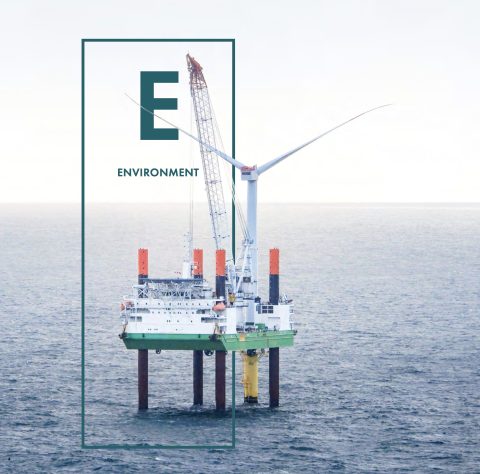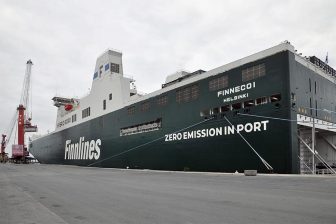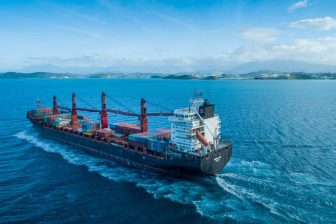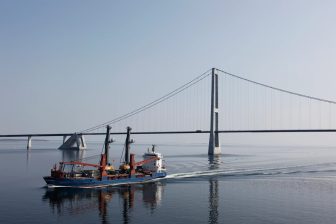
Harren’s Environmental Sustainability: Inaugural Report
The Bremen-based shipping and logistics conglomerate, Harren Group, has released its inaugural sustainability report. This first report outlines their Environmental, Sustainable and Governance (ESG) strategy and goals, as well as their performance in each sector in the 2021 calendar year. Here is what you need to know about the E in their ESGs.
Harren Group delivers a wide range of services globally, in five key business areas, including heavy lift shipping and engineering solutions, industrial logistics projects, ship owning and ship management services, offshore and salvage handling, and finally, renewable energy logistics. The company has over 20 offices in 18 countries, with 3610 employees of 57 nationalities, and approximately 100 vessels of varying types and sizes.
Though shipping remains the most environmentally efficient mode of transportation comparatively, and by far, 2,89 % of world CO2 emissions still originate from this industry, according to the IMO 4th Greenhouse Gas Study 2020. Harren thus acknowledges the importance of recognizing the role they can play in making their operations more environmentally sustainable. Indeed, the Harren group is a signatory to several programmes, including the Global Maritime Forum’s (GMF) Call to Action programme, and the Getting to Zero Coalition, a partnership between GMF and the World Economic Forum. Furthermore, the Harren Sustainability report describes their goals and strategy as being “inspired and guided by the United Nations Sustainable Development Goals (SDG).”
As such, Harren’s six main environmental sustainability goals, in chronological order, are as follows. By 2022, Harrens has committed to registering all owned and part-owned vessels in the Environmental Ship Index (ESI). By 2025 they plan on launching further research and development projects and installations related to energy efficiency exceeding 25 million USD, including newbuilding projects. By 2030, they are aiming to only order carbon-neutral and zero-emission capable vessels. By 2040, they plan to offer carbon-neutral and zero-emission shipping services to customers in the heavy lift market. Lastly, by 2050 they hope to make their owned and part-owned fleet fully carbon neutral and zero-emission capable. To achieve these goals, Harren Group is working on ocean protection, and reducing greenhouse gas emissions.
Ocean health
In line with the 2017, International Convention for the Control and Management of Ship’s Ballast Water and Sediments (BWM Convention) set by the International Maritime Organisation, to participate in preventing the global spread of potentially harmful and invasive organisms, Harren group chose to use filtration and electro chlorination technology on their fleet. They have since completed two retrofits in the tanker segment in 2021, and plan to conduct 22 retrofits across all vessel segments this year. By 2024, they will be completing the Ballast Water Treatment System (BWTS) installations across their fleet.
Harren has also initiated a drinking water supply unit trial on two vessels, in hopes of eliminating single-use plastic. Crew members can refill reusable bottles with freshwater self-sufficiently produced on board using filtration and mineralisation. The current trial leads Harren to expect a saving of 5,400 bottles per vessel per year. A fleet-wide rollout should follow the end of the trial. In the meantime, Harren is aiming to reduce plastic bottles by half by 2023.
Greenhouse gas emissions
Harren is putting emphasis on research and development to improve energy efficiency and reduce greenhouse gas emissions. One step towards this is an agreement between Harren’s heavy lift entity, SAL Heavy Lift with FUELSAVE, making them the first to apply a hydrogen/methanol injection system to the general cargo ship, the MV Trina, for a cleaner and thorough combustion process. This reduces primary fuel consumption and emissions. This trial is expected to be completed by the end of 2022, with projected results being a 10 % CO2 reduction, a 15 % SOx reduction, a 30 – 80 % NOx and a 40 % particle emission reduction.
Harren Group’s research and development teams have also been working on a new vessel class with the lowest carbon emission footprint of any vessel in its size and type for their heavy lift newbuilding programme. For this, they have been applying the latest technologies in hull design optimization, hybrid technologies for power management and shore connectivity, as well as dual-fuel designs. These new vessels should be operational by 2025
Harren group is also choosing to focus on green energy projects. For example, wind energy cargo accounts for over 40 % of their business in heavy lift, and SAL Renewables was launched as a specialised provider for offshore wind services and installation. They are also working on making their shore operations more sustainable, with electric vehicles, public transport subsidies for employees, solar panels installations, energy saving lamps.
As stated by Dr Martin Harren, Harren Group CEO: “It is great to see that the international shipping industry has committed to decarbonising faster than originally planned. We as Harren Group fully subscribe to this crucial goal and will contribute and collaborate to ensure we deliver well for the next generations.”



